White House denies Trump is sending mixed messages to Moscow, but some see ‘incoherence’
WASHINGTON — The White House announced on Monday that Russia’s consulate in Seattle is being closed and that 60 of the country’s diplomats will be expelled from the United States as a response to the Kremlin’s suspected role in the poisoning of a Russian defector in Britain earlier this month. The United Kingdom and 13 other countries said they would also send Russian diplomats home.
According to one of the senior administration officials who announced the U.S. action on a conference call with reporters, the expulsions will “help curtail Russia’s increasingly aggressive intelligence activities.” The official cited Moscow’s use of its “diplomatic establishments as intelligence platforms from which they collect information and conduct destabilizing activities in the U.S. and around the world.” The officials said Russia’s consulate in Seattle was shut down due to its “proximity to one of our submarine bases and Boeing,” adding that the 60 diplomats are among “over 100” Russian intelligence officers currently in this country. The officials described the move as a “clear signal” to Russian President Vladimir Putin that his country’s aggression will not be tolerated.
But some experts who talked to Yahoo News said President Trump has sent out confusing signals to Moscow, part of a pattern dating back to the 2016 presidential campaign, when he seemed eager to praise Russian President Vladimir Putin.
Sergei Skripal, a former Russian intelligence officer turned double agent, was poisoned along with his daughter in the British city of Salisbury on March 4. The two remain in critical condition. Britain’s government has blamed the attack on the Kremlin, which has denied any role in the poisoning.
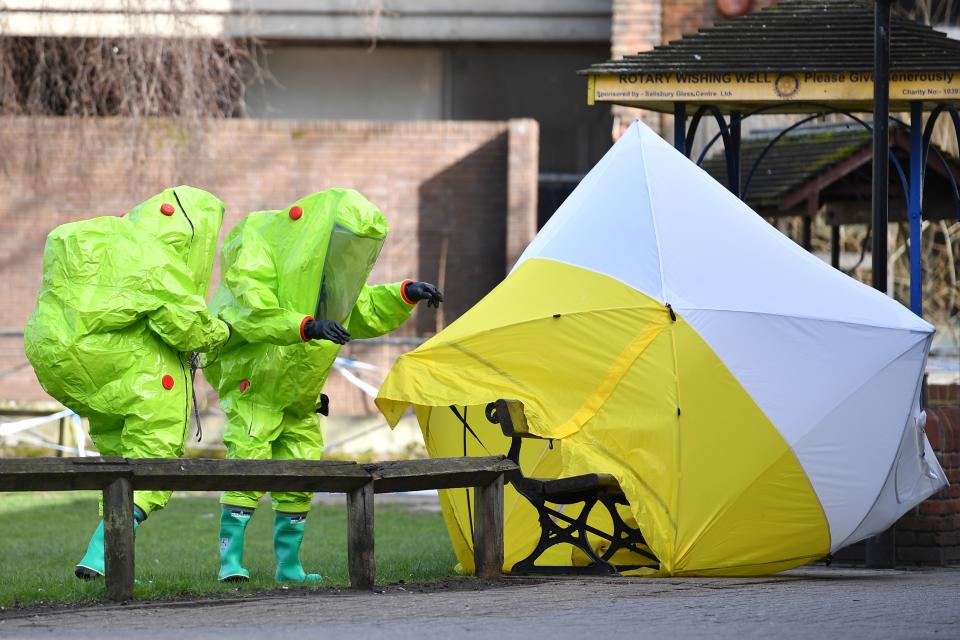
The Trump administration had faced criticism over what some in the national security community regarded as a lackadaisical response to the attack. On March 12, White House Press Secretary Sarah Huckabee Sanders called the attack on Skripal an “outrage” and offered the “fullest condemnation.” But Sanders declined to name Russia as the perpetrator even when the Associated Press’ Zeke Miller pointed out that the British government had declared it was “highly likely” that the Kremlin had played a role in the poisoning.
“Right now, we are standing with our U.K. ally. I think they’re still working through even some of the details of that,” Sanders said.
Secretary of State Rex Tillerson was the first top U.S. official to blame the attack on the Kremlin, saying “it appears that it clearly came from Russia.” Tillerson was fired the next day, and his apparent break with the White House line was said to have played a role in his dismissal, although Trump had been reported for months to have been unhappy with his secretary of state.
In Trump’s first conversation with Putin after the attack on March 21, he made no mention of the attack on Skripal. Instead, he congratulated Putin on his victory in what most outside commentators consider a sham election. It was widely reported that Trump’s briefing paper for the call included an all-caps warning, “DO NOT CONGRATULATE.”
On the conference call announcing the expulsion of the diplomats, Yahoo News asked whether the administration was sending “a mixed message” to the Kremlin, in following up this conciliatory gesture with Monday’s mass expulsion. A senior official disputed the idea that Sanders was slow to accuse Russia in the assassination attempt, suggesting that the White House was following Britain’s lead.
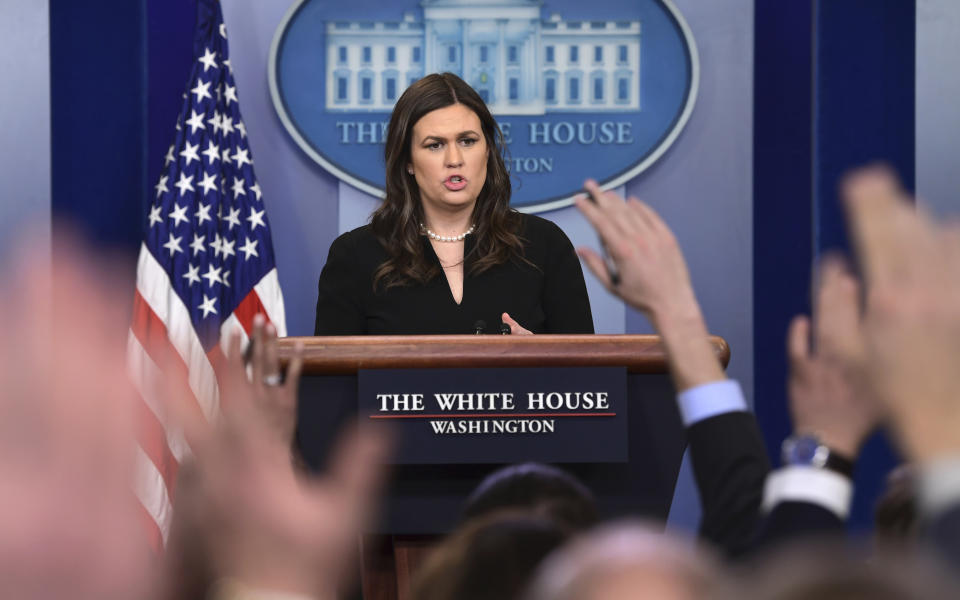
“It’s just incorrect to say that that the press secretary initially declined to blame Russia. Sarah and the White House generally, and the administration generally, were making the effort to remain consistent with what our partners in the United Kingdom said,” the official explained. “This was at a moment when the prime minister of the United Kingdom had identified the nerve agent as Russian but had not specified that the Russian government was necessarily responsible.”
That’s only partially true. At the time, British Prime Minister Theresa May said the nerve agent definitely came from Russia and that it was “highly likely” the Kremlin was responsible. However, May stopped short of definitively laying blame at the Kremlin’s feet, leaving open the possibility that Russia had allowed its nerve agent to fall into other hands. Since then May’s government has been more definitive about attributing responsibility to Russia.
The official did not address whether the dismissal of Tillerson or Trump’s phone call contributed to a mixed message to the Kremlin.
Experts who talked to Yahoo News were divided on whether the expulsion of the diplomats sends a clear signal to Moscow. Two former State Department officials suggested that the Trump administration’s posture toward Russia appears inconsistent because the president generally leaves it to aides to criticize Moscow or announce steps against the regime, while he personally seems to want to cultivate a good relationship with Putin.
Heather Conley, who is director of the Europe program at the Center for Strategic and International Studies and a former State Department official in the first Bush administration, said the United States has not shown a “unified approach” to Russia.
“The head of government needs to articulate that policy and the consistency of that policy, as do all the other agencies that are implementing that policy,” Conley said. “Normally, the White House — and the president — plays that coordinating role and sets the policy, but we sort of have the inverse here. We have the interagency, and the different departments, and the intelligence community setting one policy, and the president keeps articulating a different one when he speaks out on the subject.”
Conley described the White House’s position on Russia as “incoherent” and “confusing,” thanks to the “dissonance between the president and what the White House is putting out.”
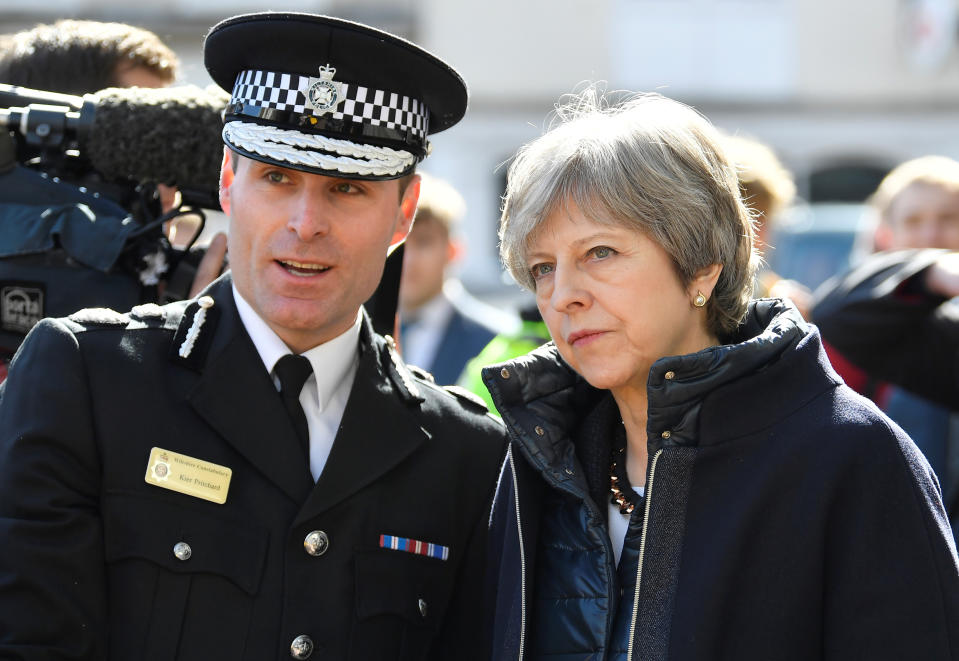
“I think no analyst or even government official or member of Congress could explain why this incoherence and inconsistency exists,” said Conley. “We just don’t understand it.”
Rick Stengel, a former under secretary of state in the Obama administration, also told Yahoo News that the Trump White House was “not being consistent” toward Russia.
“One of the hallmarks of most traditional administrations is that you have consistency from the top down. … If you’re applying sanctions, you have the commander in chief who’s supportive of those sanctions and endorses them with the same language that appears in the sanctions,” Stengel explained.
Stengel said any perception that Trump wasn’t fully backing the actions of the State Department or National Security staff could weaken their effect.
“If the Russians interpret this as a velvet glove over the fist, then they’re not going to be as hurt about it as much as if they interpreted it as a pure first,” Stengel said.
But Ian Bremmer, president of the consulting firm Eurasia Group, disagreed. While he acknowledged that Trump had previously “been deeply unwilling to blame Putin for stuff personally and publicly” he suggested that the expulsion of the diplomats is part of a recent shift toward a harder line from the White House. Bremmer pointed to sanctions and a statement by Treasury Secretary Steven Mnuchin in response to Russian cyberattacks earlier this month. He said that criticism of the congratulatory phone call from Trump to Putin was overblown.
“Trump’s decision to, ‘congratulate’ Putin on the election was late, it was perfunctory, it came after a host of Western leaders had done the same and, in many cases, in more effusive terms,” Bremmer said.
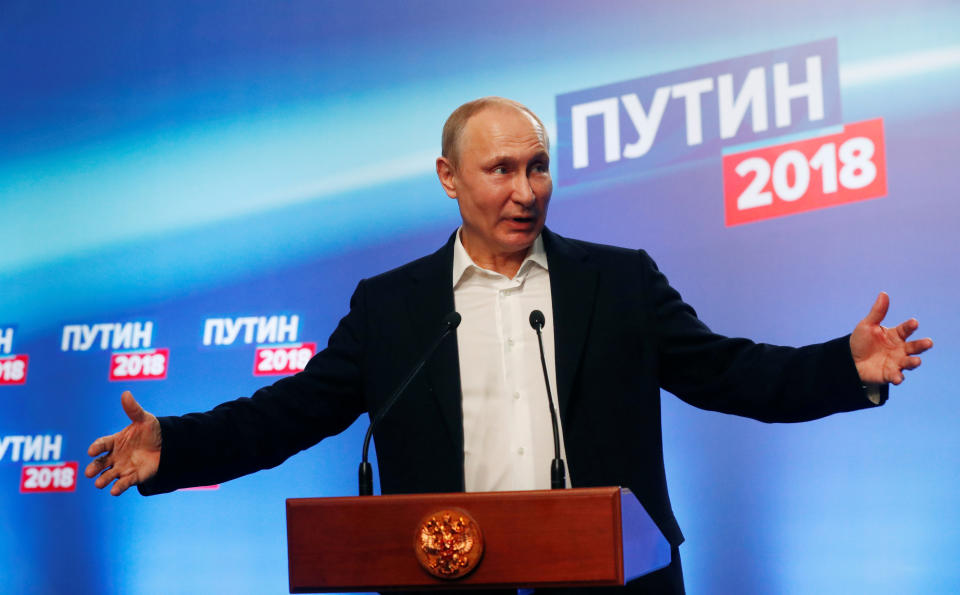
Bremmer also noted that Trump pushed Putin to address the global “arms race” during that call, and stressed that the expulsion of diplomats was not something Trump was forced to do.
“The fact that Trump has decided to take this step against Seattle and the 60 diplomats — he didn’t need to do that,” Bremmer said. “A number of European governments have not done that. This was Trump’s choice. He easily could have said no.”
The experts were also divided on how definitive a message the expulsion of the diplomats sent to Russia.
Bremmer described it as a “comparatively light response” given what the Russians have been accused of doing in the United States and the United Kingdom. He made the case that the strongest move to make would be targeting the assets of Putin’s inner circle, an argument echoed by some European law enforcement officials.
“You could do a lot more. You could go after a lot of Putin’s sort of confederates. You could close them down … shut down their assets … take their property,” said Bremmer. “The Brits have not been willing to do that. The United States has not either.”
Still, Bremmer said Trump has recently been pursuing what he called “clearly a much more hawkish policy” toward Russia. That trend could continue, since Trump appointed as his national security adviser John Bolton, a foreign policy hard liner who has called for an aggressive approach to Russia.
Conley, the former State Department official, argued that the expulsion of the diplomats was a “strong move on two levels.”
“No. 1, just from a historical perspective, this is the most Russian diplomats we have ever expelled in our history, even going back to the Cold War,” he said. “Ronald Reagan expelled 55 in 1986, so this, just the number itself, is a pretty big move.”
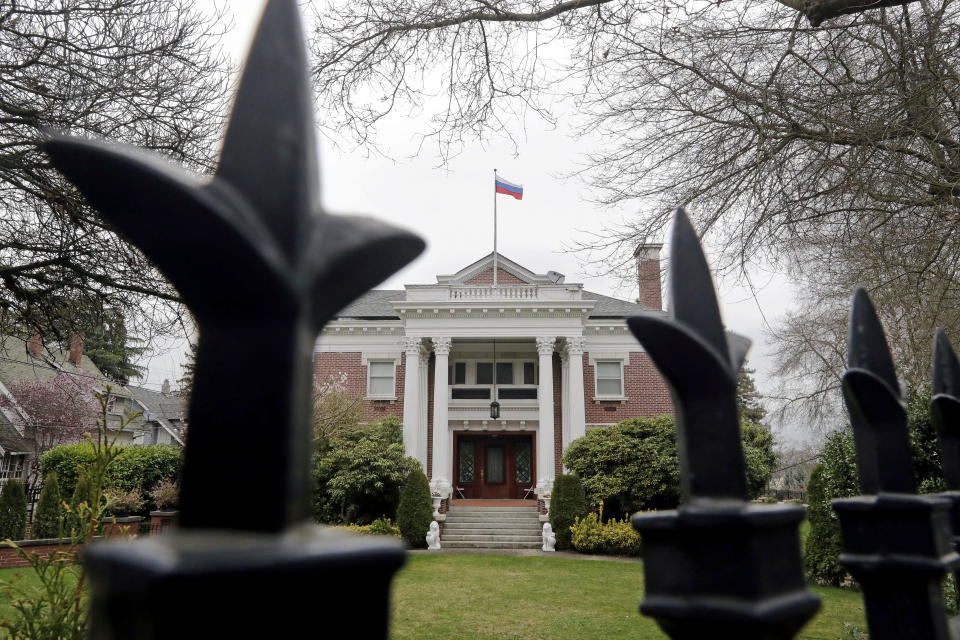
Conley also said the coordination between 15 different countries was significant.
Stengel agreed that the expulsion of the diplomats was a “good and strong step.” But he said it “can’t stand alone” and should be reinforced by a broader “sanctions regime” and a clearer denunciation of Russia by the president.
“It has to be part of a rhetorical punishment of Russia, and calling them out for all of the anti-democratic things that they are doing and have done,” Stengel said.
Both Stengel and Conley predicted that Russia would follow this move by similarly expelling American diplomats.
Stengel described Russia’s strategy as “never letting a punch go without a return punch.” And, in light of this, he argued that the Trump administration’s move was insufficient, particularly since Trump did not issue any punishments for Russia’s intervention in the U.S. election.
“Our sanctions and our tossing out of diplomats are for a violation of the sovereignty of, in this case, the U.K. And we’ve done nothing about their violation of our sovereignty during our elections,” Stengel said. “It’s an eye for, like, a whole torso, right? … We have had this body blow against us, and we basically inflicted this pinprick on them.”
_____
Read more from Yahoo News:

